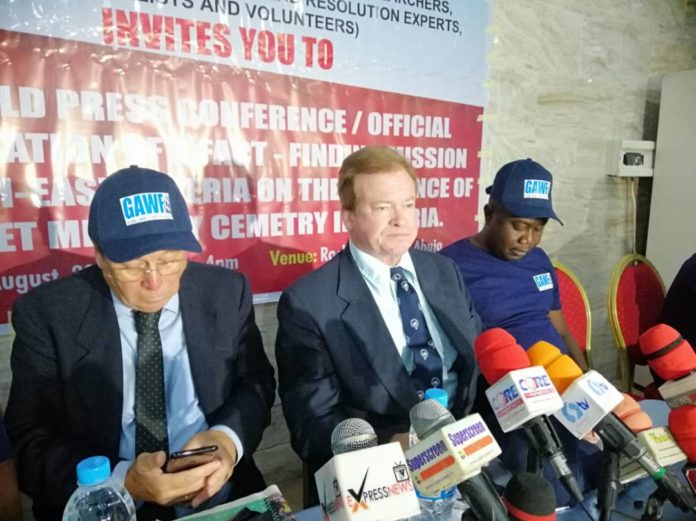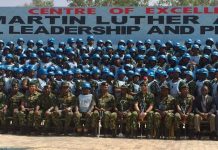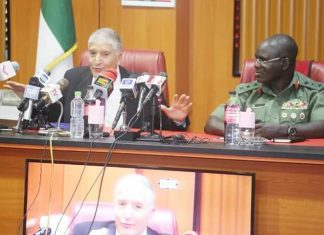A detailed investigative report has rubbished the Wall Street Journal’s publication about the Nigerian military’s alleged secret cemetery, describing it as a mere piece of fiction.
A team of intellects in a Global think tank known as “The Global Amnesty Watch”, consisting of human rights lawyers, humanitarian workers, NGOs, journalists, academics among others came to this conclusion after embarking on a verification mission to the north-east.
The group made the revelation at a public presentation of its two-week extensive research and investigation in Abuja on Friday.
In a bid to unravel mysteries alleged by the US journal, the team embarked on the mission armed with all the necessary support from the relevant stakeholders, facilitating access to military bases ( Mailamari Barracks), public and military morgues, as well as unhindered access to military personnel and their families in Maimalari barracks.
On completion of this thorough exercise, the Global Amnesty Watch concluded that the Wall Street Journal’s report is a false, misleading and not in line with the realities on the ground.
It added that the malicious piece was aimed at painting the Nigerian military in a bad light while causing a distraction to the final onslaught on Boko Haram/ISWAP terrorist confined to the fringes on the Lake Chad Basin region.
The detailed report also commended the Nigerian authorities for drastically reducing the casualty rate for three consecutive years.
However, the team advised the New York-based newspaper to forthwith offer an apology to Nigeria and retract its earlier mischievous report.
Read the full report below:
The global amnesty watch in collaboration with critical stakeholders embarked on a verification mission to northeast Nigeria under the auspices of a fact-finding committee of the global amnesty watch visited north-east Nigeria starting from strategically select communities in northern and southern Borno state, perceived as the hotbed in the ongoing battle against Boko Haram/ISWAP fighters.
The team was also mandated to visit other select communities where heavy casualties have been recorded since the fight against Boko Haram in Nigeria started. The idea was to have first-hand information in an attempt to leave the realm of speculation.
The team was also charged with the responsibility of interacting with stakeholders in areas visited such as traditional rulers, community rulers, members of civilian task force (JTF), government agencies, non-governmental Organizations, IDPs, primary healthcare centres, government hospitals, military hospitals, military personnel’s, officials of local government areas, military cemeteries, public cemeteries, as well as civilians domiciled in the affected communities.
The team was accompanied by a team of security operatives drawn from the Nigerian army, the Nigerian Police, the civil defence corps, and agents from the department of state security service (DSS).
Method of Data Collection:
The team employed the use of physical interaction and inspection of places and timeline of events in areas that have been affected in the crisis. The Team also engaged the services of indigenous interpreters to bridge the communication gaps that would arise for seamless interaction. Questionnaires were also designed in such a manner that would elicit objective responses from those to be interviewed. Video recording gadgets, as well as still cameras, were also used to capture events and places in the course of the research.
The findings were also subjected to a series of cross-examination by a team of experts in research methodology from the University of Maiduguri.
The Issues:
The Wall Street released a report on the existence of mass graves where the army authorities hurriedly buried thousands of military personnel in a bid to cover up for the heavy casualties it suffered in the fight against Boko Haram/ISWAP terrorist in North-East Nigeria.
The Wall Street Journal also alleged that a large portion of land in Maimalari barracks in Maiduguri, Borno state has been fenced to serve as the burial site for over 1000 soldiers killed at the battlefront. It was also alleged that some farmland had been taken over by the military authorities and fenced from the viewing eyes of the public to serve as an extension of the secret graveyard for soldiers killed in the line of duty.
The Wall Street Journal report also alleged that military commanders were not conversant with operational strategies which resulted in the poor coordination and the execution of the war against the Boko Haram/ISWAP terrorist. It also sighted poor welfare of troops, lack of fighting equipment’s as well as highly demoralized Military engaged in the fight against Boko Haram/ISWAP terrorist.
Our Findings:
The Team of researchers after an extensive review of all the allegations contained in the report of the Wall Street Journal, the Global Amnesty Watch consequently embarked on the mission armed with all the necessary support it can get from the relevant stakeholders who facilitated access to military bases ( Mailamari Barracks), public and military morgues, as well as an unhindered access to military personnel and their families in Maimalari barracks who were granted permission to speak to the Team without fear of victimization from the military authorities.
Secret Grave:
The Team upon an extensive survey of Maimalari Barracks and its environs could not establish places where the secret grave is located as there were no signs of new earthwork in the area earmarked as the burial site for military personnel killed in the battlefront. The only sign of earthwork was dated June 2018 on about 20 graves with the names of the soldiers inscribed on a wooden plate stating the date of burial and name.
The large portion of the site had been taken over by grasses as there were no signs of a pathway or recent excavation of the ground to suggest that mass burials had taken place in recent times.
Perimeter Fencing:
It was also discovered that as standard with military formations, the fences stand high as a defence strategy to ward off intruders into military facilities. The picture of the perimeter fencing used in the Wall Street Journal Report had been erected since 2010 in the heat of the Boko Haram crisis, and not a sign of recent construction work has noticed the length of the military facility.
The visible addition to the perimeter fence is the erection of watch towers mounted by solders and covered with sandbags. The tour guide stated that in military formations across Nigeria, there is always a reasonable distance between it and the civilian population and Maiduguri is not an exception.
Seized Farm Lands:
The Team interacted with locals within the vicinity of Nigerian Army facility and it was stated that since the Boko Haram crisis started farming activities had reduced, and people are not willing to risk their lives unnecessarily. They also noted that the land in question belonged to the Nigerian Army, and they only took advantage of its vastness to cultivate crops since it was lying fallow.
The bulk of those interviewed also stated that the Nigerian Army advised those using the Army land for farming purpose to desist from doing so after cultivation, and this message was passed to them through their district heads.
The state ministry of Agriculture compensated those who planted economic trees and crops under the supervision of state and local government officials. It was also discovered that the issue of mass movement of corpses in the dead of night could not have been possible because the whole area is well illuminated.
Overflowing Morgues:
The Team visited the Nigerian Army Reference Hospital where it interacted with Military and civilian workers. From the interactions, it was gathered that the story by the Wall Street Journal was at best a fiction as there were no such cases of overflowing corpses recorded in recent times. A visit to the wards was greeted by widespread excitement from soldiers receiving treatment for various degrees of injuries.
The bulk of those of admission were victims of landmines planted by Boko Haram terrorist in the theatre of war. The Chief Medical Director of the hospital stated that cases that cannot be handled at the hospital are transferred to the 44 Nigerian Army Reference Hospital in Kaduna. A total number of 64 soldiers were on admission at the time of the visit.
The same goes for public morgues within Maiduguri metropolis. Where it was expressly stated that the Nigerian Army does not patronize the facility, but from time to time, their doctors are called upon to render assistance in areas they are experts.
The Atmosphere in Maimalari Barracks:
The atmosphere in Maimalari Barracks is that of the typical military formation. Families of military personnel are seen going about their regular business but for the high alert placed on security. The Team was granted permission to interact undercover without revealing the identities of those interviewed, and the issue raised mostly were the strict restrictions placed on entry and exit from the barracks by the authorities.
Those randomly interviewed seemed confused when some of the issues alleged in the report of the Wall Street Journal were raised. Thy refuted most of the claims, especially on mass burials and wondered how such activities would happen without the news spreading around the barracks as most of their husbands are directly involved in the battlefront.
They also stated the Nigerian Army Officers Wives Association (NAOWA) which they belong to holds meetings regularly where issues were raised and discussed.
Poor Decisions by Commanders:
The allegation of a poor decision by commanders could not be verified at the officers and soldiers interviewed. The case of the General Officer Commanding 7 Division of the Nigerian Army in Maiduguri is that of sterling performance that culminated in a special promotion by the President from the rank of a Brigadier General to a Major General for outstanding performance and dedication to duty. The bulk of those interviewed was full of praises for the military commanders whom they described as professionals.
Officers and soldiers corroborated this much at the battlefront in areas like Melete, Dambao, Baga, Faltori and other areas of military operations. They questioned the criteria used in arriving at the allegation of a poor decision. They stated expressly that the claim is laced with mischief with no iota of truth.
Operations and Funding:
The Team upon inspection of military facilities discovered that emphasis had been placed on an advanced level of security awareness. The bulk of the troops interviewed were in high spirit and exhibited the sophistication of their armoury. Serviceable military tanks were well-positioned at strategic places with tons of riffles and defence equipment.
The Team experienced high spirits amongst the troops at the battlefront who were full of praises for the Chief of Army Staff whom they described as the father of modern Nigerian Army. They stated that Lt. Gen. Tukur Buratai had been a role model and every officer and soldier of the Nigerian Army aspire to be like him.
The stated that in the past three years, he had taken the issue of welfare of the troops seriously unlike in times past where those in the battlefront were neglected and left to their fate. His frequent visits to the theatre of operations have served as a morale booster.
Conclusion:
The Team concludes that the Wall Street Journal Report is a mischievous attempt at painting the Nigerian authorities in a bad light as well as causing a distraction to the final onslaught on Boko Haram/ISWAP terrorist who has been confined to the fringes on the Lake Chad Basin region. It must be stated that the Team relied on first-hand knowledge and not rumours or hearsays.
Our findings were in sharp contrast to the allegations raised in the Wall Street Journal report, such that it seems there must be a sinister motive as there are no substantial pieces of evidence to support their claims in the report.
The Team also wondered the methodology that was employed in the compilation of the report without reference to the key actors in the war in North-East Nigeria.
Recommendations:
The Global Amnesty Watch in light of the following revelations make the following recommendations:
That Wall Street Journal should tender an unreserved apology to the Nigerian authorities for the highly misleading report it issued without recourse to the sensibilities of families and relatives of those engaged in the fight against terrorism in Nigeria.
That the Wall Street Journal report is highly misleading and with no iota of truth and without any form of objectivity in the light of the fact that there are no secret graveyards anywhere in Northeast Nigeria and as such the Nigerian Authorities must begin the process of seeking redress in court against the Wall Street Journal.
That the promoters of Wall Street Journal should as a matter of urgency publish a retraction to its earlier mischievous report, stating the accurate picture of events with regards to the operations of the Nigerian Military in North-East Nigeria.
That the Nigerian Authorities should begin the process of scrutinizing the activities of foreign media organizations in North-East Nigeria to protect the general public from toxic information that could have far-reaching psychological effects in the polity.
That the Nigerian Authorities must enforce a ban on the activities of the Wall Street Journal and its agents in Nigeria.



Join Television Nigerian Whatsapp Now
Join Television Nigerian Facebook Now
Join Television Nigerian Twitter Now
Join Television Nigerian YouTUbe Now





